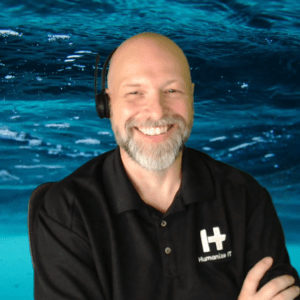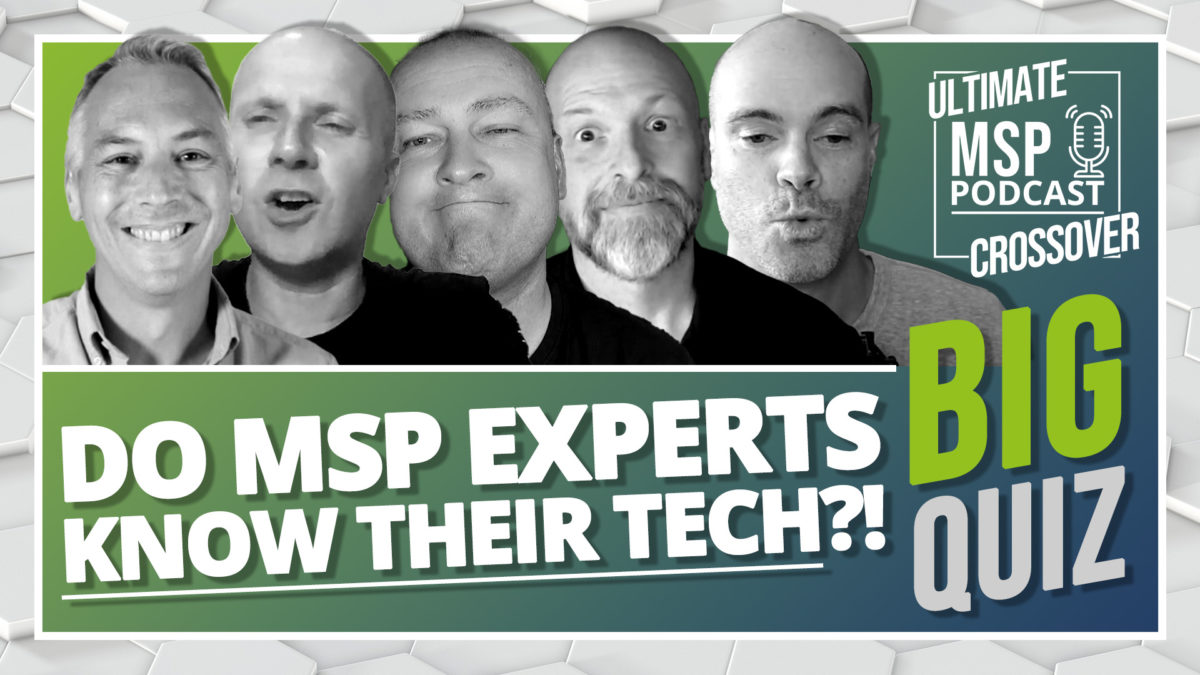
The Big Quiz:
In addition to the normal podcast schedule, we bring you this special show to mark the end of a month-long MSP podcast collaboration.
Throughout September 2022, six leading MSP podcasters joined forces to share their combined knowledge and to highlight the other podcasts on offer.
The Ultimate MSP podcast crossover event culminates with a special show on Friday September 30th 2022, in which our hosts come together to tackle a fun tech quiz.
Listen / watch to see how the MSP podcasters get on, plus find out if you could do any better! PLUS to celebrate the event, you could win $1000.
Find out more about this September’s Ultimate MSP podcast crossover event, including the $1000 prize:
http://mspmarketingedge.com/MSPpodcastcrossover
The Big Quiz host:

Paul Green is the host of The MSP Marketing Podcast.
Listen every Tuesday for powerful marketing and business growth advice to get more new clients, grow monthly recurring revenue and increase net profit. The show is about 30 minutes long and you can either watch it on YouTube or your normal podcast platform (full subscribe links further below).
Check out The MSP Marketing Podcast:
http://mspmarketingedge.com/podcast-intro/
Connect with Paul on LinkedIn:
https://www.linkedin.com/in/paul-green-msp-marketing/
Contestants:

Richard Tubb is the host of TubbTalk.
Richard provides expert advice to help IT businesses grow. Richard has worked with the owners of hundreds of MSPs to free up their time, concentrate on doing what is important and make more money.
Check out TubbTalk:
https://www.tubblog.co.uk/podcast/
Connect with Richard on LinkedIn:
https://www.linkedin.com/in/richardtubb/

Ian Luckett is the host of The IT Experts Podcast.
Ian is a Business Growth Consultant and specialises in helping business owners in the IT & MSP space. Ian has always been a big fan of Personal Development and his passion has spread over the years into the business world.
Check out The IT Experts Podcast:
https://innovatetosuccess.com/itega-podcast/
Connect with Ian on LinkedIn:
https://www.linkedin.com/in/ianluckett/

Skip Ziegler is the co-host of The Humanize IT Podcast.
In each episode of their show, hosts Adam Walter, Skip Ziegler and other industry experts, show business owners, technology professionals and problem-solvers how to excel their careers with a new, more conversation-based approach to IT.
Check out the Humanize IT Podcast:
https://anchor.fm/humanize-it
Connect with Skip on LinkedIn:
https://www.linkedin.com/in/skipziegler

Todd Kane is the host of the Evolved Radio Podcast.
Todd is an accomplished business leader with 20+ years of experience and runs Evolved Management Consulting, helping managed IT companies increase profit and decrease stress.
Check out the Evolved Radio Podcast:
https://www.evolvedmgmt.com/podcast
Connect with Todd on LinkedIn:
https://ca.linkedin.com/in/toddakane
Extra show notes:
- The regular podcast is out every Tuesday on your favourite podcast platform
- Presented by Paul Green, an MSP marketing expert:
- https://www.linkedin.com/in/paul-green-msp-marketing/
- http://mspmarketingedge.com/about/
- Find out more about September’s MSP marketing podcast crossover event including the $1000 prize (note the closing date):
- http://mspmarketingedge.com/MSPpodcastcrossover
- Subscribe to Paul’s YouTube channel:
- https://www.youtube.com/mspmarketing
- Subscribe to this podcast using your favourite podcast provider:
- Got a question from the show? Email Paul directly: hello@
paulgreensmspmarketing.com
Transcription:
Voiceover:
The ultimate MSP Podcast, Crossover, Big Quiz.
Paul Green:
Hello, and welcome to the MSP podcast, Crossover. We are at the end of an amazing month, helping you to find cool new MSP podcasts to listen to on whichever is your favourite podcast platform. In this show, we are here just to have a little bit of fun. We’ve got together a whole bunch of friends, all of whom have some great podcasts and we’ll tell you about those towards the end of the show. But let’s have some fun in the next 20 minutes or so.
Paul Green:
Now, we also of course have some money for you to win. We have a $1,000 to be won as part of our competition and the way to enter this competition is so simple. All you need to do and you can do it now, is get onto LinkedIn or Facebook, or whichever is your favourite social platform, and just write something about this MSP podcast Crossover. And then all you need to do is just make sure you add the hashtag #MSPpodcastcrossover. What we’ll do is we will pull someone at random in the next, I think it’s about the next 24 hours or so, we’ll pull someone at random who’s done that #MSPpodcastcrossover, and that person will win $1,000 of cash. So let’s crack on with this show and let’s get our guests to introduce themselves.
Ian Luckett:
Hi, my name’s Ian Luckett from the IT Experts podcast over here in the UK.
Skip Ziegler:
And my name is Skip Ziegler, I co-host the Humanize IT podcast, and we are a bit of a global company, but generally based in North America and the United States.
Richard Tubb:
Hi I’m Richard Tubb. I am the host of TubbTalk, the podcast for IT consultants, and I’m coming to you live and in living colour from the studio, garage, in Newcastle upon Tyne in the Northeast of England.
Todd Kane:
Hey everyone. I’m Todd Kane. I’m a host of Evolved Radio Podcast and I’m coming from Vancouver Island in West Coast of Canada.
Paul Green:
Thank you very much gentlemen, and welcome to our podcast, Crossover. Now we are going to be having some fun with kind of like a quiz, kind of like a MSP game show tonight. And I’ve actually split you into two teams. So we have team Atari and we have team Commodore. Now Ian Luckett, you are lucky enough to be the captain of team Atari.
Ian Luckett:
Fantastic.
Paul Green:
And tonight, I know, I’m going to give you your team member and that will be Skip. So if you two would like to virtually shake hands, even though you’re 4,000 miles apart, that would be wonderful. And Richard Tubb, you are the team captain of team Commodore and of course you’ll be playing with Todd. Now the rules of the game are very, very simple. We have three rounds of questions and they’re questions which are not too techy, but they are related to technology and to computing. And in fact, if you wanted to play along at home, as we’re going along, you can see if you could beat our experts. We’ve got a total of 260 points in total that you could win. So as we’re going along, I will give you the correct answers and let’s see if you can beat any of our teams.
Paul Green:
Gentlemen, are you ready for round one?
Skip Ziegler:
Yes.
Todd Kane:
Ready.
Ian Luckett:
As we ever will be.
Paul Green:
Listen the high levels of enthusiasm there. Let’s do that again.
Skip Ziegler:
This is right out of my wheel house, gentlemen. I’m excited.
Paul Green:
Are you ready for round one?
Skip Ziegler:
Yes.
Richard Tubb:
Yes.
Todd Kane:
Yes.
Voiceover:
The ultimate MSP podcast Crossover, Big Quiz.
Paul Green:
Ah, okay, here we go. Right. This round is called the technology test. So remember to shout out your team name, not just the answer. Question number one. What year was the first ever USB released?
Ian Luckett:
Atari. I’m going to say 1989.
Paul Green:
1989. Okay. Team Commodore. Go on, Richard
Richard Tubb:
1991.
Paul Green:
Oh, okay. So you are closer, but we’re not quite there. So I’m not going to give any points there. The actual answer is 1996. That was the answer. By the way, we’ve got producer James is lurking in the background. James, would you mind keeping score for me? That would be great if you can.
Richard Tubb:
It shouldn’t be too difficult.
Paul Green:
It’s not going to be. Yeah. You can get a cup of tea, James. I don’t think there’s going to be much to do. I do have a bonus follow up question though.
Ian Luckett:
Oh, great.
Paul Green:
This should really be for the winner, but seeing as we don’t have a winner on that question, this is open to everyone. How many connector types are there on USB currently?
Richard Tubb:
Commodore. Four.
Paul Green:
Is totally incorrect. Sorry. Let me rephrase the question. How many connector types have they been since the introduction of USB? That’s what I meant to say.
Ian Luckett:
Oh, Atari. Seven.
Paul Green:
Okay. Still wrong. And nowhere near. This is going to be a nightmare, isn’t it? Rich went four and he’s looking to the sky, trying to recall information. I’m thinking, I’m just going to have a bang at this and just see what happens.
Richard Tubb:
I’m in a bit of an advantage here, it’s got to be said. I’m looking around. I’ve got most of those USB connectors in the room with me now, but I can’t place them all.
Paul Green:
Skip, do you want to have a guess?
Skip Ziegler:
I’m going to go… If seven didn’t seem right, I’m going to go 14. We’ll just double it.
Paul Green:
And there we go. Straight on the money. That’s the answer. 10 points to Atari there. Okay. Second question, this is much easier this one. Should have started with this one. Which university did Bill Gates drop out of?
Skip Ziegler:
Atari.
Todd Kane:
Commodore.
Paul Green:
So let’s go with Atari.
Skip Ziegler:
I think it was MIT.
Paul Green:
Was it MIT? It wasn’t MIT. So Todd, what’s the correct answer?
Todd Kane:
Harvard.
Paul Green:
Is correct. Now Todd, because you got that right you get to answer the bonus question. So no shouting out for this one unless Todd gets it wrong. For a bonus 10 points Todd, what was Bill Gates studying? Now, he was actually studying three things at Harvard. So I’ll give you these points if you get any one of those three things.
Todd Kane:
We’ll go with the obvious, business and computer science.
Paul Green:
Computer science is correct. He was actually studying law. He was majoring in law with maths and computer science, which is good. Okay, here we go. It’s open to the whole group again. Your question is this. What was the first thing ever sold on eBay?
Richard Tubb:
Commodore.
Paul Green:
Richard Tubb.
Richard Tubb:
A teddy bear.
Paul Green:
It wasn’t a teddy bear. There are MSPs around the planet right now with their head in their hands.
Richard Tubb:
Was it a watch?
Paul Green:
It wasn’t a watch. No. I’ll give you a clue. It was something that was broken. So the creator of eBay, Pierre Omidyar, I think his name is, he created eBay and he thought, what can I sell? I’ve built this platform. And he saw something on his desk, which had been broken. He’d been meaning to fix it. And he said, he put it on eBay. And he was very surprised when it was sold just a few days later.
Ian Luckett:
Atari. Was it a mug?
Paul Green:
It wasn’t a mug. I was a mug for suggesting this idea.
Ian Luckett:
I’m glad if one good thing comes out of tonight, Paul, it’s your realization of your ideas.
Skip Ziegler:
I’ve read this story. I just can’t remember what it was. It was something. It wasn’t what you would think a normal eBay item would be. Yeah, it was something you’d kind of put to the curb, but he instead put it on eBay and it sold rather surprisingly to his credit, I believe.
Paul Green:
Exactly, exactly that. So that’s the founding story. And the answer is a broken laser pointer. Which I guess back in the mid 90s was something that you could fix. Okay. For the bonus then and no one’s going to get this. I don’t know why I’m even bothering with this, because this is a harder question. The most expensive item ever sold on eBay was a yacht. And that was bought by Roman Abramovich, who is one of these Russian oligarchs, is that how you say it? And he owns Chelsea Football Club here in the UK. How much did he spend buying this yacht on eBay?
Richard Tubb:
Commodore. £35 million.
Paul Green:
That’s a good guess. Not quite there. Let’s see if we can get nearer to the correct guess. Atari.
Ian Luckett:
50 million.
Paul Green:
50 million. It was actually $85 million.
Ian Luckett:
So we win that.
Paul Green:
Buying the yacht. I’m not going to give any points on that one.
Skip Ziegler:
I’m trying to do the dollars to pounds conversions in my head.
Paul Green:
It was, yeah. So it was bought, I forget when this was, but that was actually just the deposit. So he spent $85 million on the deposit on eBay and the total cost of the yacht was $168 million.
Ian Luckett:
Imagine the fees on that.
Paul Green:
His PayPal fees will be enormous. This next question is a bit of a bit sci-fi one, but it’s also a tech one. What unit of length is equal to around about 5.8 trillion miles?
Todd Kane:
Commodore. A parsec.
Paul Green:
It’s not a parsec. That’s a very Star Trek answer, but we need a much simpler Star Trek answer than that.
Skip Ziegler:
Atari. Is it an AU?
Paul Green:
It’s not an AU. I don’t know what an AU is and let’s not go down that rabbit hole.
Skip Ziegler:
[inaudible 00:09:04].
Paul Green:
You so are. One more guess. We’ll take one more guess.
Richard Tubb:
Commodore. A light year.
Paul Green:
Yes. Richard Tubb. Finally someone gets some points.
Ian Luckett:
That’s what I was going to say.
Paul Green:
10 points for you, Richard Tubb. Now, your follow up question. This is just for Richard, and the bonus question is this is actually about the film Lightyear, which is the recent Disney Pixar film, which is frankly one of the worst Pixar films ever made. I was so bored, I slept through half of it, but Richard, your question is for 10 more bonus points, who played Buzz Lightyear in the most recent film? And I’ll give you a clue…
Richard Tubb:
Can I not defer to my colleague, Todd here?
Paul Green:
You can. If he knows. Todd, as a clue for you, it wasn’t the person who voiced Buzz Lightyear in the original Toy Story film.
Richard Tubb:
So yeah, it was Tim Allen before. Was it Chris Pratt?
Paul Green:
Not Chris Pratt, but you’re right. It was a Chris. It was Chris Evans as in Captain America. Chris Evans. So let’s give Todd and Richard five bonus points there because someone needs to earn some points. Right. One more question in the technology test round. Open to everyone. If you don’t get this, this is just pathetic. What is the name of the classic 1972 arcade game based on table tennis?
Richard Tubb:
Commodore. Pong.
Paul Green:
Yes. Richard Tubb there. The Mr. Retro Technology.
Richard Tubb:
I’ve got one here as well.
Paul Green:
Have you? Okay. Well, did you know that Pong actually wasn’t the first arcade game? There was one other game released just before it in 1971. If you know the name, Richard, we will give you another 10 points.
Richard Tubb:
I’m going to say it’s Space War.
Paul Green:
It’s not Space War. It was Computer Space. Although that may be the same thing. In fact, you’ll probably go and Google it and find out that they were the same thing. So let’s give you the points anyway. Oh, that was fun. That was fun. We’ve only got two more rounds to go. Producer James, tell us. I think we all know, but tell us what’s the point situation at the end of round one?
James Lett:
Well, it is painfully close, not. Atari are on 10. Commodore on 65.
Ian Luckett:
[inaudible 00:11:14] need to come in on this.
Skip Ziegler:
We’re coming in a close second, Ian.
Voiceover:
The ultimate MSP podcast Crossover, Big Quiz.
Paul Green:
So this second round is called Acronym Annoyance. And we’ve got a whole series of technology acronyms, you hear them every day, but do you know what they stand for? So everyone’s back. There are no bonus questions in this. It’s just a rapid fire round. Everyone’s back in the game. First one is what does this acronym stand for? PDF.
Richard Tubb:
Commodore. Portable documents format.
Paul Green:
What a hero. Absolutely straight in there. Second question and everyone should know this. What does SAAS stand for? SAAS.
Skip Ziegler:
Atari.
Richard Tubb:
Commodore.
Paul Green:
That was Skip for Atari.
Skip Ziegler:
Software as a service.
Paul Green:
Correct. What does IP stand for?
Richard Tubb:
Commodore.
Ian Luckett:
Atari.
Paul Green:
That was Richard.
Richard Tubb:
Yeah. We can go with a number of different things, but I’m going to say internet protocol.
Paul Green:
Correct, yes. And the other one of course would be…
Ian Luckett:
Intellectual property.
Richard Tubb:
Intellectual property.
Paul Green:
Yeah. Intellectual property.
Ian Luckett:
Give us a point for that. Come on.
Skip Ziegler:
Yes.
Paul Green:
No. What does URL stand for?
Richard Tubb:
Commodore.
Paul Green:
Richard again?
Richard Tubb:
Universal resource locator.
Paul Green:
I’m sorry. You actually got one of those words wrong. So I’ll open that to the Atari team. So resource locator is correct, but it’s not universal. It is?
Ian Luckett:
Skip, have you got any idea?
Skip Ziegler:
I guess I thought…
Ian Luckett:
No. Atari then. Is it unified resource?
Paul Green:
It’s not unified. It’s uniform.
Ian Luckett:
That’s it. Same thing.
Paul Green:
You can argue all you want, but you’re not going to get the points. So five points to Commodore there. There is a company called LG Electronics. What does LG stand for?
Todd Kane:
Commodore.
Richard Tubb:
Commodore. Lucky gold star.
Paul Green:
Correct Richard. Are you Googling these, Richard, as we go along or have you got Alexa in your ear?
Richard Tubb:
No. I’ll answer the next question like this.
Paul Green:
Okay. Final question on this round, you will be surprised to know, or you may be surprised to know that the word laser is an acronym. What does it stand for?
Richard Tubb:
I’ll give you this one, Ian. That’s why I’m keeping quiet.
Ian Luckett:
Yeah. Cheers. Cheers, Rich. I really appreciate it. I’m trying to think of something funny that’s not rude because I’ve been told not to swear.
Paul Green:
I’ll give you a starter with the first word. The first word is light.
Ian Luckett:
Light and sound accentuating radar.
Paul Green:
You’re just making it up now.
Ian Luckett:
I am. You’re absolutely right.
Paul Green:
It’s light amplification by stimulated emission of radiation. Who knew? Who knew? Okay. End of round two. Producer James, what are the scores on the doors?
James Lett:
Well, including one pity point, 21 to Atari and to Commodore it’s 105.
Paul Green:
Very good. Very good. I like the idea of pity points.
Voiceover:
The ultimate MSP podcast Crossover, Big Quiz.
Paul Green:
So we are at the final round. Gentlemen, you need to bring your A game to this because Atari, the opportunity is there for you to win, but you’re going to have to really go for it. We have, I think it’s about 10 questions. And Richard Tubb, you’re going to love this because this is your world. You’re literally sat amongst this. This is the Retro Computing rapid fire round.
Richard Tubb:
I’m just laughing at Ian’s face here.
Paul Green:
I didn’t do this deliberately. Ian, the marketing round is next year. We’ll do that in next year’s quiz.
Ian Luckett:
Yeah, thanks.
Paul Green:
Based on the success of this year’s quiz, there isn’t going to be another quiz next year. So here we go. Question number one. What was the name of the portable storage disc used to transfer files between computers in the old days?
Richard Tubb:
Commodore.
Paul Green:
That was Richard.
Richard Tubb:
Floppy disk.
Paul Green:
Correct. In the Tandy TRS-80, which coincidentally, that was the first computer my family ever owned. What did the initials TRS stand for?
Richard Tubb:
Commodore.
Paul Green:
Richard.
Richard Tubb:
Tandy Radio System.
Paul Green:
Incorrect. You were there with the first two words, but the final word was wrong and I’m going to give a clue to Atari.
Richard Tubb:
Oh no. I’ve got it now.
Paul Green:
It was the name and don’t say it, Richard. It was the name of the shops these were sold in.
Ian Luckett:
I think I might have it. And if I have it, I’m going to be really delighted.
Paul Green:
I think this was a US only chain. So Skip, you might know the answer to this. It’s Tandy Radio…
Ian Luckett:
Shack.
Paul Green:
Correct. Correct. Very good. Right. Next question. What was the very first computer with a… Now, listen to the wording of this. Not what was the first home computer, but what was the very first computer with a graphical user interface?
Todd Kane:
Commodore.
Paul Green:
Todd.
Todd Kane:
Oh, wait. No. Was it the Lisa?
Paul Green:
It wasn’t the Lisa. That was the first one available to the public.
Skip Ziegler:
Atari.
Paul Green:
Skip.
Skip Ziegler:
I believe it was the Amiga.
Paul Green:
It wasn’t the Amiga. That’s a few years after this. It was…
Richard Tubb:
Commodore.
Paul Green:
Oh, Richard.
Richard Tubb:
The very first available computer, not very first home computer, yeah?
Paul Green:
The very first available. The first ever computer with a graphical user interface.
Richard Tubb:
I think it was… It a Xerox Park?
Paul Green:
Do you know what? You can get five points for that. Because Xerox Park were the developers of it. It was the Alto, A-L-T-O. That was the very first one. And the very first GUI computer for the public was of course the Apple Lisa of which about seven of those were sold. Next question. In the Sinclair ZX Spectrum, what were the keys made out of?
Richard Tubb:
Commodore.
Paul Green:
Richard.
Richard Tubb:
Rubber.
Paul Green:
Rubber is the answer. Question for Skip and Todd. In America, did you call that the ZX Spectrum?
Skip Ziegler:
I’m drawing a complete blank on this one.
Paul Green:
Maybe that was just a UK computer.
Richard Tubb:
I’ve got one here. Can I show it to you?
Paul Green:
They were pretty cool. They were pretty cool. Next question. In 1996, which games console did the Nintendo… Oh, you have actually got one. You’ve actually got one.
Richard Tubb:
Yeah, I wasn’t joking.
Paul Green:
Richard, if you want to get your Nintendo collection ready, because this next question’s about Nintendo. What’s impressive is how quickly you sourced that, that is actually quite an impressive thing.
Todd Kane:
Yes.
Paul Green:
In 1996, what console did the Nintendo 64 replace?
Richard Tubb:
Commodore. The Nintendo Entertainment System.
Paul Green:
Technically incorrect. So I’m going to pass that to Atari.
Ian Luckett:
Atari. Was it the Commodore 32?
Paul Green:
It was the Nintendo Entertainment System, but there’s… No, it’s not. I’m just going to give you a clue Ian, before you jump into another pit of no points. The Nintendo Entertainment System, which was part of it but there’s a word missing at the beginning.
Todd Kane:
I got it.
Paul Green:
Todd.
Todd Kane:
Can I go for a point?
Paul Green:
Hang on. You’re on the wrong team. This is an Atari question now. So Skip or Ian?
Ian Luckett:
Yeah. Todd, can you tell Skip?
Skip Ziegler:
Yeah, please.
Paul Green:
Look. Richard’s actually got one. Richard. Just tell us, just put us out of our misery.
Richard Tubb:
It’s the Super Nintendo.
Paul Green:
That’s right. It was the Super Nintendo. The SNES. Richard will know the answer to this as well. And this is pretty much Richard and Todd have got this victory in the can now, but in which game did Mario make his first ever appearance?
Skip Ziegler:
Atari. It was actually in Donkey Kong, wasn’t it?
Ian Luckett:
Yay. We got some point.
Paul Green:
Yeah. Very good. We’re down to our final three questions. What year did the first IBM PC come out?
Skip Ziegler:
Atari.
Paul Green:
Go for it, Skip.
Skip Ziegler:
1982.
Paul Green:
Oh, so close. Do you know what? Just for the hell of it, I’m going to give you another chance.
Ian Luckett:
Are you going to go higher or lower?
Paul Green:
You are one year out.
Skip Ziegler:
I’ll go just a little bit more…
Paul Green:
So you got a 50/50 chance.
Skip Ziegler:
All right. We’ll go up. 1983. I went the wrong way.
Paul Green:
Wrong way. It was 1981. Let’s see if you can get this one. This is for everyone again. What year did the first version of Windows come out?
Skip Ziegler:
I was there. I just can’t remember it.
Richard Tubb:
Commodore.
Paul Green:
Oh, let’s go Richard.
Richard Tubb:
1987.
Paul Green:
Two years out. I’ve just given the answer away. Atari, say 1985 and you get the points.
Skip Ziegler:
Atari. 1989.
Paul Green:
No. Did you say ’89?
Skip Ziegler:
I thought you were pointing at us. Oh no.
Paul Green:
Okay.
Richard Tubb:
Nil points.
Paul Green:
No points for anyone in that one. The final question should be an easy one. There is a very famous TV advert, which came out back in the day. It was based on a very famous novel called 1984. And it was used to launch which computer?
Skip Ziegler:
Atari.
Paul Green:
Let’s go for it, Skip.
Skip Ziegler:
The Macintosh.
Paul Green:
It was the Apple Mac. Amazing. Right, gentlemen. Thank you very much.
Skip Ziegler:
That was a Super Bowl commercial. So I got a US advantage on that one.
Paul Green:
Yes you did. Although I think it’s world famous. Producer James, what are our final scores on the doors and who is our winner today?
James Lett:
Well, it’s been very entertaining listening and watching you guys. However, there’s been nothing to laugh about in terms of the scores. Ending up Atari on 51. In the massive lead, Commodore with 130.
Paul Green:
Very good. Very good.
James Lett:
Congratulations.
Paul Green:
Thank you very much, everyone. That has been some fun. Of course, the purpose of us being here is to tell every MSP on the planet about all of our great podcasts, because podcasts are a great way to learn and to find out new stuff and to improve your business. So if you would like to take the final word, starting with you, Ian, just to tell us briefly about your podcast and especially tell us which is the best episode to get started with on your podcast.
Ian Luckett:
So you would be delighted to know that our podcast is non-technical. So in terms of everything to do with growing an MSP, we can help with the other things like the sales and the marketing and the leadership and all of that great stuff. So tune in to the IT Experts podcast, where you’ll hear myself and my business partner, Stuart Warwick, help you learn how to build a seven figure MSP, and if you’re already there, help you get to five and go faster. And our best show, the one that I think is the most relevant right now is Episode 99. And it’s where Stuart and I talk about the MSP journey and where we talk about the different parts, the different stages, the different gaps, the different process, and the headspace that you go through as an MSP business owner. So I’d love for you to check it out and thank you ever so much, Paul, for letting us be absolutely annihilated by Richard Tubb once again.
Skip Ziegler:
Our podcast is Humanize IT with the co-founder Adam Walter of Humanize IT. And our goal is really to engage MSPs in the business conversation. Adam and I are both very techy guys. We really enjoy jumping into that, but we realize that technology is great, but businesses don’t buy technology because it’s great. They buy technology because it helps their business out. So our conversation is a mix of business owners and technical professionals who are really looking to engage and empower technology to drive and support organizations. I think one of the more entertaining podcasts that we have is, How to Fire Your MSP. And it’s an interesting conversation because it also leads in how to hire one as well. But what are you really looking for? You’re getting a resource to help your organization be more successful. You need technology. What are the really important elements? And so we look at some of the bad ones, because those are good indicators that you need to move on. And those are really good indicators of who you need to engage with to make your organization more successful.
Richard Tubb:
So I’m the host of TubbTalk, the podcast for IT Consultants where I speak to the smartest, most successful people in the IT industry who give freely of their time and experience, ideas, tips, and techniques to help you to grow your MSP business. My personal favorite episode of the past few years was Episode 50 when I spoke to David Allen, who is the godfather of modern productivity, the author behind the very, very famous book, million selling book, Getting Things Done. And in the episode, David shares a lot of tips for getting things done, surprisingly or not. Getting stuff done, enabling you to grow your IT business and get all that stuff done that you keep saying you’ll get around to and never do.
Todd Kane:
I’m Todd Kane and I host the Evolved Radio podcast. And it’s a bit of a mix. It’s not all MSP content. The content lately has been very MSP centric, but there’s a pretty good archive. I think we’re on Episode 90 and you can go all the way back. It’s really just the intersection of business and technology. And quite often the MSP space comes up in that, but there’s also some just fun, weird, interesting, nerdy topics that I enjoy, like nuclear technology and drones and all kinds of other of interesting, fascinating stuff. So lots to pick through. Probably a good entry point would be Episode 75 where I do I think a six part series on MSP insights, where I interview MSP owners and operators, just to get their insights of what have you learned in starting and growing your business? So it’d definitely be relevant for this audience and it’s a good six part series to work through, but there’s tons of other content to check out as well on all kinds of cool and interesting topics.
Paul Green:
Those are great podcasts and there’s mine as well to throw into the mix, it’s called Paul Green’s MSP Marketing podcast and every Tuesday on your favorite podcast platform, we talk about MSP marketing and business growth, is always tons of ideas and some amazing guests and in fact, everyone on our Crossover today has been a guest on the podcast at some point. All we’re doing is talking about how you can grow your MSP and make more money by improving your marketing.
Paul Green:
So thank you very much for being with us on this Crossover. Don’t forget you’ve just got a few hours left to win $1,000. If you’ve enjoyed what we’ve been talking about here, go and write something about it on LinkedIn and make sure you use this hashtag, #MSPpodcastcrossover. And that’s all you have to do to get in that draw to win $1,000. We might be back next year doing this, I think based on the performance of the quiz, it certainly won’t be a technology quiz. It might be on something else, but thank you for listening to us. Thank you for watching us if you’ve been on YouTube watching this and maybe we’ll see you again next year. Bye.
Ian Luckett:
See you later.
Skip Ziegler:
See you all.
Richard Tubb:
Ta ta for now.
Todd Kane:
Bye.
Voiceover:
The ultimate MSP podcast, Crossover.


